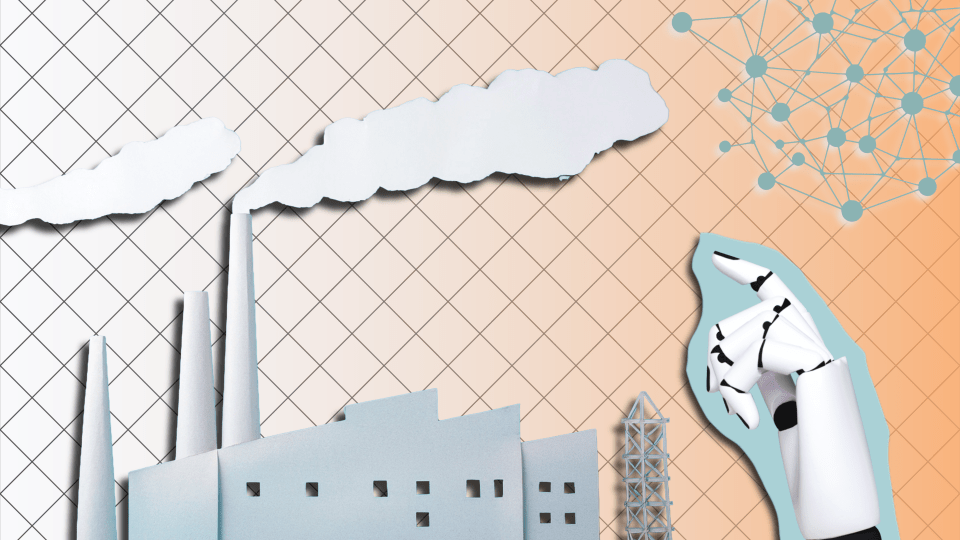Can the Industrial Revolution Prepare Us for the AI Era?
November 18, 2025
- Author
- Jay Pfeifer

As artificial intelligence (AI) seeps into every corner of life, the future of the workplace is cloudier than ever. Just last week, Amazon announced that it was cutting 14,000 corporate, white-collar jobs, partially attributing the layoffs to the efficiency offered by AI. Have we reached a tipping point when bots are superior to human workers?
Economics Professor Siobhan O’Keefe says that technology has been upending the workforce—more or less constantly—since the dawn of the industrial era.
We talked to O’Keefe for some additional context on how history might illuminate the AI era—and also underscore the unique challenges of the current moment.
Machines have been “taking” jobs from humans since the late 19th century. How can those early disruptions show us how the AI era might play out?
In some ways it’s helpful to think about original mechanization; it’s very analogous to modern AI.
Let’s take one example: making shoes.
Historically, crafting shoes by hand was labor-intensive. Before mechanization, it took someone all day to make a pair of shoes by hand. A cobbler had so many specialized skills—they had to make the wood templates for shoes, cut and sew leather, and who knows what else.
In factories, they could make shoes faster, of course. But those workers also had specialized skills and tools, like the machines they were using. Sometimes we think of mechanization as a de-skilling event, but that's not always true. It's just a very different set of skills.
But you also have to look at these shifts from the perspective of the people who are buying shoes.
Exactly. Before mass production, people really only had one, maybe two pairs of shoes. Now, I don't know much about your fashion choices, but I would be shocked if you only had two pairs of shoes.
So this is an interesting tension. Mechanization brings benefits to the consumer, but if I were a cobbler in the late 1800s, I would be in danger of being replaced.
Likewise, if you had told a mother of a young child a hundred years ago about the automatic washing machine, she wouldn’t believe you. But she probably fantasized about something like it.
I think it can be hard to see that; there probably are benefits that we can't even imagine yet that I'm trying to remain cognizant of in my own thinking about this.
What makes AI so different?
One way is by thinking about what we call ‘substitutes’ and ‘complements.’ So the washing machine is a substitute. It’s doing that work instead of me. And this is often what comes up when we're thinking about the initial stages of mechanization.
Technology can be a substitute—think of robots in a car manufacturing plant—but it has also proven to be a complement, especially for traditionally white-collar jobs.
Imagine doing any of our work without a computer. You are more productive because you have access to technology. I can’t do statistical analysis without computers.

But AI is different. It's potentially automating a whole different set of tasks than we've seen in the past. It opens up a new set of opportunities, but it also presents a new set of challenges because we don't have a historical analog for disruption to these types of tasks.
Economics Professor
Historically, it seems that mechanization or automation eventually played out like a zero-sum game. Technology created new jobs while it replaced others. AI seems to be different.
There are winners and losers, especially in the short term—and while who wins and who loses can be unpredictable, they sometimes fall along the same class, race, and gender lines that a lot of society falls along.
Some of my own work looks at changes in the tasks workers did in the economy in the 20th century, when we saw technological change in the form of electrification, automation, and computers. And we find that Black workers, on aggregate, have a generational lag during times of disruption. For example, consider non-routine analytic tasks, which are common in white-collar work and tend to be highly represented in the best-paid occupations.
If we look at two workers who are doing a routine, manual job (the type of job that is about to be replaced by automation) and then we follow them 10 or 20 years into the future, the white worker is much more likely to have moved up the job ladder to a job that involves a lot of well-paid, analytical tasks. But the Black worker is more likely to have moved into a lower-paying, heavily physical occupation. Although we can’t say for sure in our work, these transitions probably look different because of differences in access to education and retraining programs, where the workers live, as well as labor market discrimination.
While these differences in job transitions get smaller throughout the 20th century, they don’t completely go away, at least not in one lifetime. So we're still seeing evidence that these inequalities perpetuate themselves through technological shocks, and we'll have to see how that plays out with AI.
But on a positive note, as we get to the 2000s, it does seem that the intergenerational dynamic has changed. Even if their fathers had different job outcomes, the children of these workers were equally likely to move up the task spectrum into higher-paying jobs. Only time will tell if that's true for AI.



